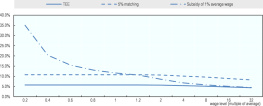OECD - OECD Territorial Reviews: Japan 2016
Here you can read online OECD - OECD Territorial Reviews: Japan 2016 full text of the book (entire story) in english for free. Download pdf and epub, get meaning, cover and reviews about this ebook. year: 2016, publisher: OECD Publishing, genre: Politics. Description of the work, (preface) as well as reviews are available. Best literature library LitArk.com created for fans of good reading and offers a wide selection of genres:
Romance novel
Science fiction
Adventure
Detective
Science
History
Home and family
Prose
Art
Politics
Computer
Non-fiction
Religion
Business
Children
Humor
Choose a favorite category and find really read worthwhile books. Enjoy immersion in the world of imagination, feel the emotions of the characters or learn something new for yourself, make an fascinating discovery.

OECD Territorial Reviews: Japan 2016: summary, description and annotation
We offer to read an annotation, description, summary or preface (depends on what the author of the book "OECD Territorial Reviews: Japan 2016" wrote himself). If you haven't found the necessary information about the book — write in the comments, we will try to find it.
OECD: author's other books
Who wrote OECD Territorial Reviews: Japan 2016? Find out the surname, the name of the author of the book and a list of all author's works by series.
OECD Territorial Reviews: Japan 2016 — read online for free the complete book (whole text) full work
Below is the text of the book, divided by pages. System saving the place of the last page read, allows you to conveniently read the book "OECD Territorial Reviews: Japan 2016" online for free, without having to search again every time where you left off. Put a bookmark, and you can go to the page where you finished reading at any time.
Font size:
Interval:
Bookmark:

Flicitations et merci davoir tlcharg lun de nos tout nouveaux ePub en version bta.
Nous exprimentons ce nouveau format pour nos publications. En effet, mme si lePub est formidable pour des livres composs de texte linaire, le lecteur peut tre confront quelques dysfonctionnements avec les publications comportant des tableaux et des graphiques tout dpend du type de support de lecture que vous utilisez.
Afin de profiter dune exprience de lecture optimale, nous vous recommandons :
- Dutiliser la dernire version du systme dexploitation de votre support de lecture.
- De lire en orientation portrait.
- De rduire la taille de caractres si les tableaux en grand format sont difficiles lire.
Comme ce format est encore en version bta, nous aimerions recevoir vos impressions et remarques sur votre exprience de lecture, bonne ou autre, pour que nous puissions lamliorer lavenir. Dans votre message, merci de bien vouloir nous indiquer prcisment quel appareil et quel systme dexploitation vous avez utilis ainsi que le titre de la publication concerne. Vous pouvez adresser vos remarques ladresse suivante :
Merci !
Congratulations and thank-you for downloading one of our brand-new ePub-in-beta editions.
We're experimenting with this new format and, while ePub is fantastic for books with linear text, for books with charts, tables and graphs weve found some things may not work perfectly it depends on the device youre using.
So, for an optimal reading experience, we recommend:
- Using the latest version of your devices operating system.
- Reading in portrait mode.
- If large tables are tricky to read, try reducing the text size.
As this is an ePub-in-beta edition, we would be glad to receive feedback on your reading experience, good or otherwise, so we can improve for the future. When writing, please let us know which device/operating system you were using and the title of the publication. Write to:
Thank you!
OECD (2016), OECD Territorial Reviews: Japan 2016, OECD Territorial Reviews, OECD Publishing, Paris, http://dx.doi.org/10.1787/9789264250543-en.

At the beginning of this new millennium, many OECD countries find themselves embarked on a demographic transition that is without precedent in history. Our populations are ageing rapidly and, in many cases, they are also beginning to shrink. While these processes have gone further in Japan than elsewhere, they are by no means unique to Japan many OECD countries will move down the same path as the century unfolds, with important consequences for both economic performance and settlement patterns.
It is difficult to exaggerate the socio-economic importance of this shift. For most of human history, a long-term trend of population growth was a given, even if that trend was sometimes disrupted by sharp mortality crises, such as famines, wars or epidemics. Moreover, human communities of all sizes tended to have pyramid-shaped age structures, with the younger cohorts being the largest and older cohorts the smallest. As life expectancy increased, the pyramid grew taller but its shape remained. Then, as fertility fell sharply in the latter part of the last century in many countries, the bottom of the pyramid began to contract and the bulge in the distribution moved up until, in many places, we have begun to see something closer to an inverted pyramid emerging an age structure unlike any we have ever seen before, in which the largest cohorts are the oldest.
Yet the implications of this change for social progress and prosperity are not set in stone: they depend greatly on the policy choices we make. That is why the OECDs Regional Development Policy Committee has begun to devote increasing attention to the consequences of demographic change for cities and regions. This OECD Territorial Review follows a recent study of ageing in cities that looks at policy responses at the local level.
Japan is working to design an integrated, long-term approach to population ageing and demographic decline, aligning spatial and sectoral policies to strengthen productivity growth and ensure a sustainable long-term settlement pattern. It seeks to seize the opportunities offered by demographic change, as well as to address the problems it creates. The new National Spatial strategy adopted in 2015 is central to this effort.
While it is too early to judge the long-term impact of this strategy, we do find grounds for optimism: the economic analysis confirms that Japanese cities function well, generating comparatively strong agglomeration benefits, though better horizontal co-operation among the municipalities in metropolitan areas could enhance these benefits substantially. Japans rural areas, despite their difficulties, actually outperform most of their OECD peers and are in many cases pioneering revitalisation strategies based on local assets and potentials. At all levels from the national to the local, public- and private-sector actors are devising innovative and often place-based solutions. Many of these are likely to be of great interest and relevance to the many OECD countries facing similar challenges.
The OECD Secretariat is grateful for the co-operation and support of the numerous Japanese officials, experts and businesspeople who met the OECD team preparing the review and in other ways participated in the review process. The Secretariat is particularly grateful to the Ministry of Land, Infrastructure, Transport and Tourism for its informational, financial and logistical support, as well as its deep engagement with the OECD Review team at all stages in the process.
Font size:
Interval:
Bookmark:
Similar books «OECD Territorial Reviews: Japan 2016»
Look at similar books to OECD Territorial Reviews: Japan 2016. We have selected literature similar in name and meaning in the hope of providing readers with more options to find new, interesting, not yet read works.
Discussion, reviews of the book OECD Territorial Reviews: Japan 2016 and just readers' own opinions. Leave your comments, write what you think about the work, its meaning or the main characters. Specify what exactly you liked and what you didn't like, and why you think so.
















